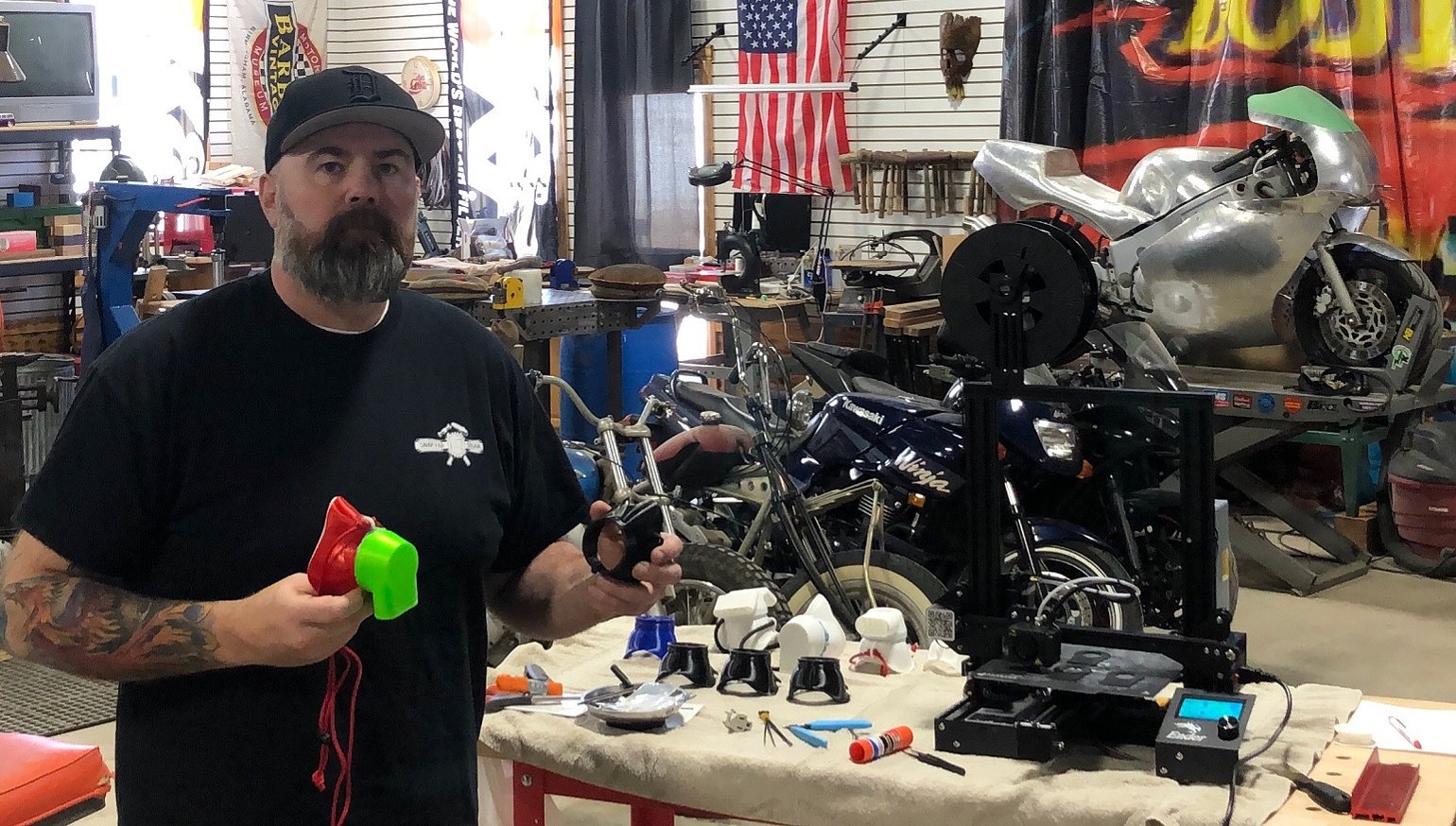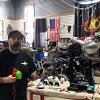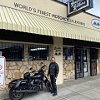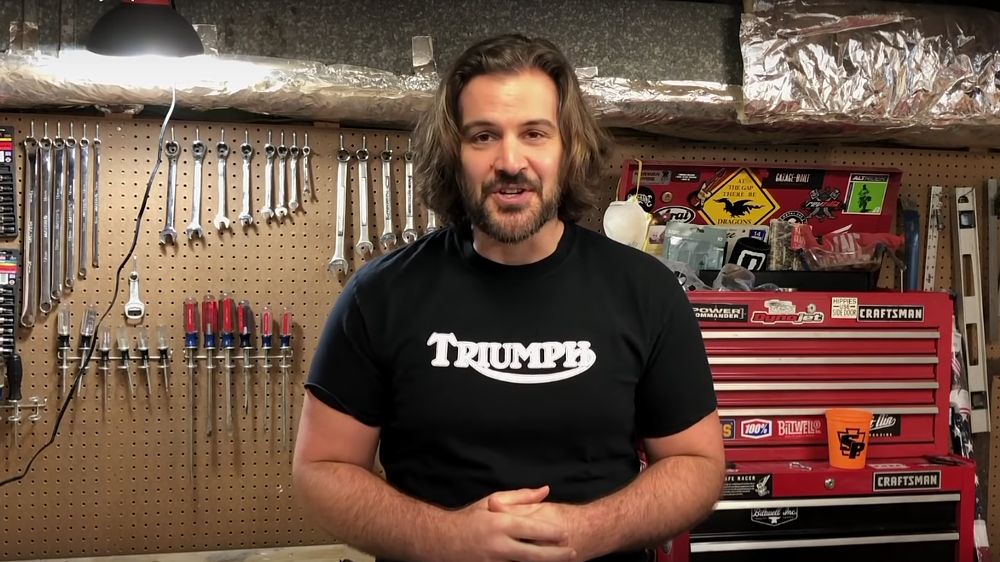Most U.S. motorcyclists are free to ride. That’s less true in other countries where police enforce tighter lockdowns and send riders home unless they can prove they’re traveling to an essential job or running an approved errand.
But whether we’re riding or not, the global motorcycle community has found big and small ways to take the fight to COVID-19.
Wuhan, China
Some riders were essential workers at the beginning, during the original lockdown in Wuhan. Many residents could not leave their apartments at all, and relied on motorcycle couriers to deliver food and medicine, as described in this rather moving account in The New York Times. I was also fascinated by the photos of the rider’s utilitarian electric motorcycle.
Varese, Italy
The next major epicenter was the Lombardy region in northern Italy. That felt personal, because I’ve visited the MV Agusta factory in Varese several times. The surrounding area — including the rich and cosmopolitan city of Bergamo — was hit especially hard.
MV stepped up with the donation of a QuantStudio 5 Real-Time PCR System. It is capable of conducting polymerase chain reaction tests on dozens of samples at a time, and should greatly increase Varese hospitals’ ability to test for the coronavirus. Depending on how they’re configured, QuantStudio 5 machines appear to sell for anywhere from $25,000 to close to $100,000, so it’s a generous donation from MV, which is a small manufacturer in the global scheme of things.
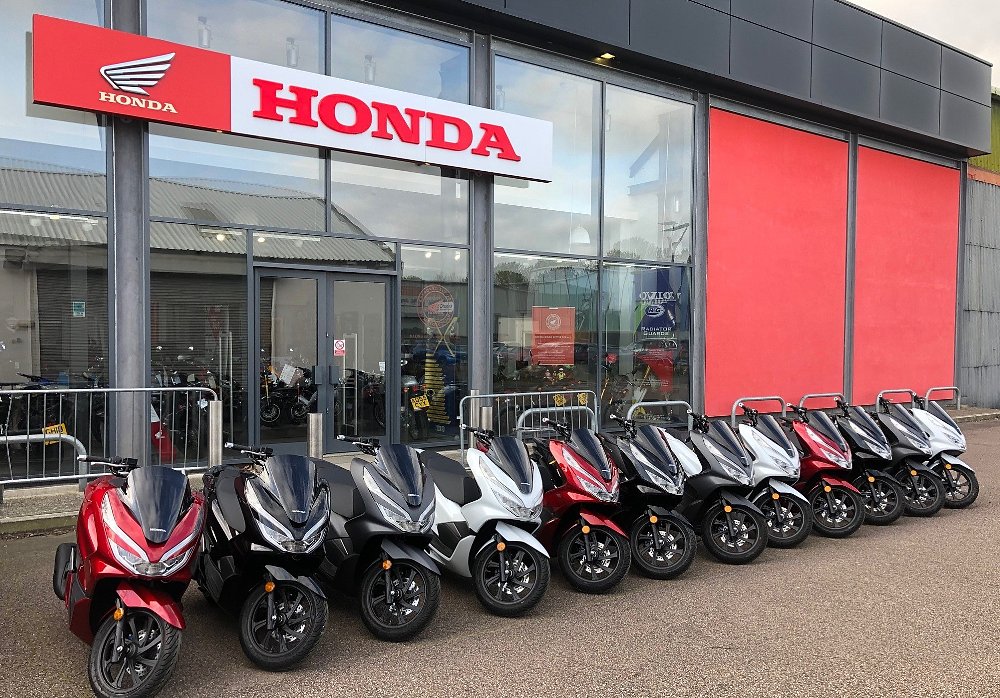
Kent, England
The UK was one of the next countries to be hit hard. The National Health Service put out a call for volunteers who could deliver medicine to senior citizens and immunocompromised people who have been ordered to stay home. The NHS received offers of help from 750,000 Britons.
To help those volunteers make deliveries, Honda UK has teamed up with a dealer, Maidstone Honda, to supply twenty PCX 125 scooters for volunteers’ use. The dealership is in Aylesford, just southeast of London. I guess when this is over customers will be able to get a good deal on a lightly used scooter.
Brentwood, New York and Sturgis, South Dakota
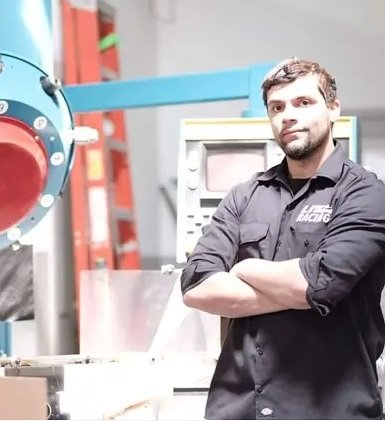
“It’s like Chernobyl here,” said Price, describing the sense of frantic work to prevent a complete meltdown in New York area hospitals. (Price also participated in rescue and recovery operations as a firefighter, on that fateful September 11.)
Long Island Racing just acquired a big 3D printer back in January. The plan was to print velocity stacks for use inside sport bike airboxes. Then, Mendez’ wife, who is a nurse, told him that local hospitals couldn’t get face masks from any of their usual suppliers. Mendez put the velocity stack project on hold, and found a digital model of a human head he could load into the Fusion 360 CAD program he uses for design. He then designed a form-fitting soft plastic mask from scratch.
In the Instagram video below, Mendez points out that, “This filter material is capable of catching 0.3-micron particles at a higher rate than an N95 (mask). We want to beat that due to our innate competitive nature.”
Spoken like a real racer! And, like a real racer, Matt’s continuously improving his product. However unlike in racing, he’s immediately sharing his secrets. Mendez will send STL files to anyone who wants to start printing them.
Austin, Texas
Moira Zinn is an avid biker who’s coordinating about 25 volunteer couriers. They’re making pickups and deliveries for the Austin chapter of "Masks for Docs," which she described as “A network of 3D printer nerds producing personal protective gear for health care workers.”
The purpose of the Masks for Docs shield is to provide a first line of defense against the tiny droplets and aerosols that infected people cough out, or expel just by talking or breathing. The shield design is now approved by the NIH and its use is becoming more common among first responders and even food service workers. New York, Los Angeles, and Austin were among the first cities where volunteers began making the protective face shields, but the fast-growing Masks for Docs group now has over 100 chapters around the world.
Moira and her volunteers ride around picking up masks from 3D printers all over Austin and bring them to a donated space at Native Hostel, a hip hotel that’s closed due to the pandemic. There, small bundles of masks are repackaged, usually 500 at a time, in boxes that are delivered to hospitals. (Those packages, as you might expect, are too big to deliver by motorcycle.) The couriers also drop off filament to the people doing 3D printing, so they can make more.
“We’re already wearing protective gear, and we’re all so antsy,” Moira told me, by way of describing the satisfaction of getting out on her motorcycle and doing something useful.
Vice also ran a readable (albeit somewhat breathless) first-person account of a motorcyclist delivering Masks for Docs PPE in New York City.
San Francisco, California
For the duration of the pandemic, the Bay Area’s Dames Don’t Care motorcycle club has rebranded itself as Dames Do Care and members are volunteering as couriers, per this story from TV station KPIX.
San Diego, California
100%, a company that manufactures goggles for motorcycle and glasses for bicycle racers, was one of the first to realize that products they sold for sports could also protect health care workers and first responders. The company has donated thousands of pairs of goggles to people who need extra protection from the virus and is the official San Diego drop-off point for other companies, shops, and individual riders who want to donate gear to Goggles for Docs.
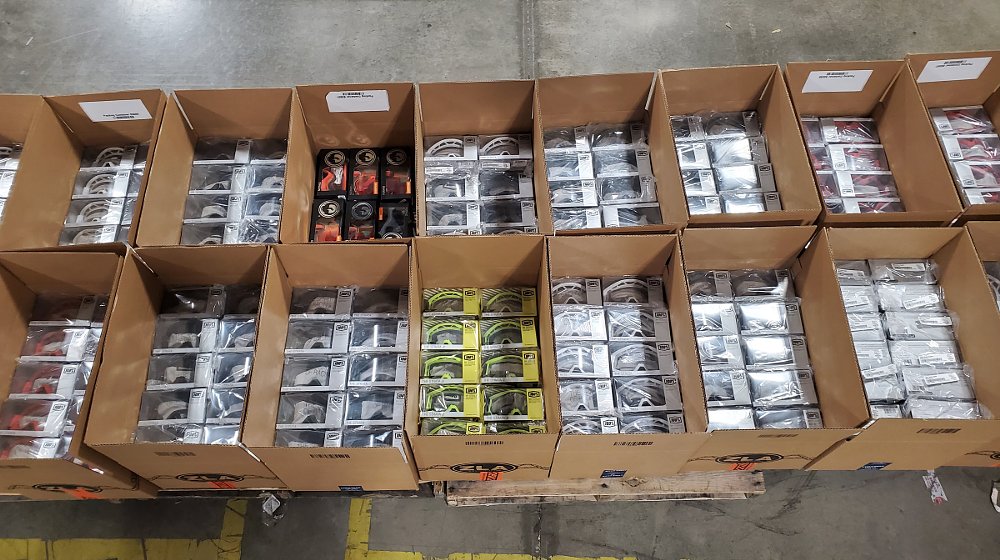
Philadelphia, Pennsylvania
In March, RevZilla also recognized that motorcycle goggles could help with the personal protection needs for health care workers. ComotoCares, the giving program of RevZilla's parent company, Comoto, shifted its focus to fighting the pandemic and committed to providing $50,000 worth of goggles to health care workers. So far, goggles have been delivered to the front lines in six states. ComotoCares also shifted another $30,000 from the charitable giving budget to address pandemic-related needs identified by Comoto employees in the communities where they live and work.
Torrance, California
American Honda Motor Co. has pledged $1 million in support of food banks and meal programs throughout North America. The company will also match any Honda employee’s donation to their local food bank, up to $1,000.
Ten Honda facilities in North America combined to donate over 200,000 items to healthcare providers and first responders, including gloves, face shields, N95 protective masks, alcohol wipes, and half-mask respirators. In addition, employees at five different Honda facilities are using 3D printers to manufacture parts for face shields.
Fall River, Massachusetts
Vanson Leathers has been making great riding and racing leathers in New England since the early 1970s. Vanson was initially deemed a non-essential business and its employees were sent home, but now it’s been recategorized as essential and has reopened as a mask factory.
As first reported by Motorcycle Cruiser, the owner of Vanson called one of his friends, a Boston area ER surgeon, who told him that his hospital was short of all personal protective gear, from gowns and masks to full Tyvek bunny suits. The doc sent Vanson samples of the items he needed, including N95 masks in critically short supply.
Unfortunately, Vanson can’t get the raw material needed to make N95 masks from scratch, but the company quickly created a pattern for a washable cotton mask that can be worn over an N95 mask to extend its life. Vanson’s also selling its masks to the general public, which should free up N95 and surgical masks for use by health care workers.
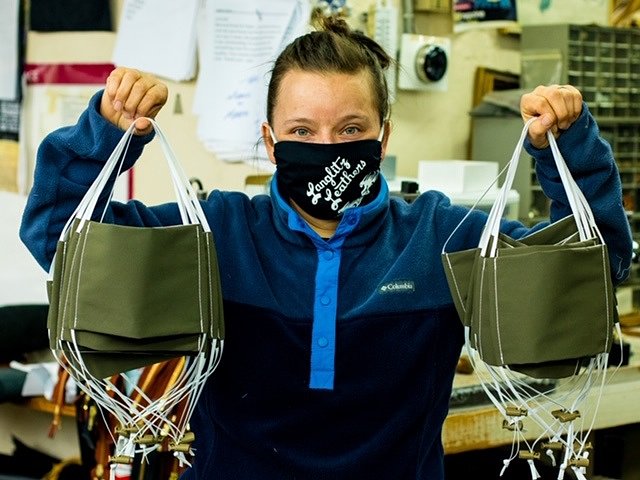
Portland, Oregon
Langlitz Leathers — hands down the coolest leather shop on the planet — has also temporarily shut down an operation that’s been producing the same iconic jackets since 1947. After the CDC recommended cloth face coverings earlier this month, Langlitz general manager Bennie Goodson and some employees returned to the workshop to make about 800 masks.
Dublin, Ireland
Jonny Miller, an Irish road racer, messaged me on Twitter to say that he’s also a volunteer "Blood Biker" with Blood Bikes East, a medical courier service based in Dublin that serves the eastern part of Ireland. Blood Bikers, who volunteer in chapters across the UK, usually deliver blood, medicine, or even breast milk. But lately they’ve been delivering thousands of COVID-19 tests, so they’re handling far more trips than normal.
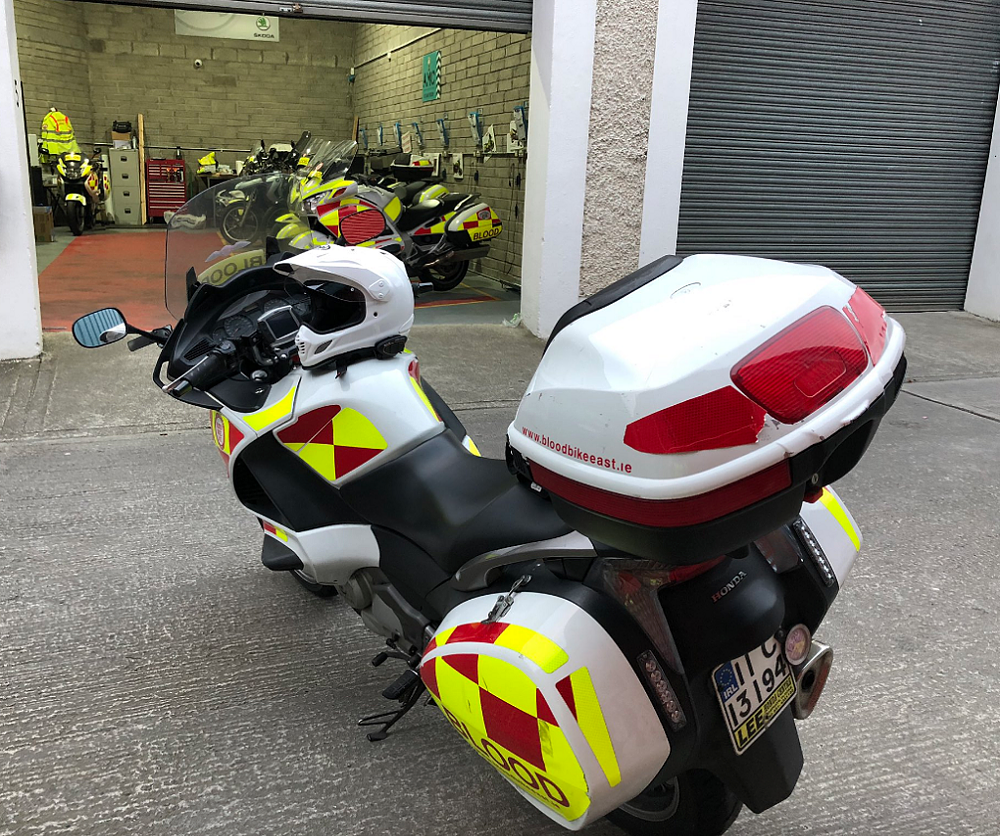
Originally, motorcycles were used for deliveries because they were better at slipping through traffic with urgently needed blood products. There hasn’t been much gridlock lately, so that filtering ability is not critical, but Blood Bikers still free up critically needed ambulances and health care personnel, who would otherwise have run those errands.
Minden, Canada
Tekrider, a company that makes upper-body armor for snowmobilers — including a vest that’s becoming popular with off-road motorcycle racers — has stopped producing its normal products and shifted to making PPE, including full surgical gowns, booties, and "bouffant" headgear. Unlike most of the other projects I’ve described here, Tekrider’s not donating this stuff, they’re selling it. (But at least they’re helping to make more of it available.)
Lincoln, Nebraska
Last month, one of Lincoln’s largest hospitals realized that it was running out of hand sanitizer and that its usual suppliers were all sold out. The hospital got FDA approval to make its own sanitizer, but the raw materials were also sold out. Somehow, someone put two and two together and asked if the paint department at Kawasaki’s Lincoln manufacturing facility had a few hundred gallons of isopropyl alcohol, and hydrogen peroxide that it could spare.
The timing was perfect, as Kawasaki had just made the difficult decision to shut down the plant in order to prevent spreading the virus among the workers. The original hospital was able to compound hundreds of gallons of sanitizer that it has since sent to over 50 other hospitals.
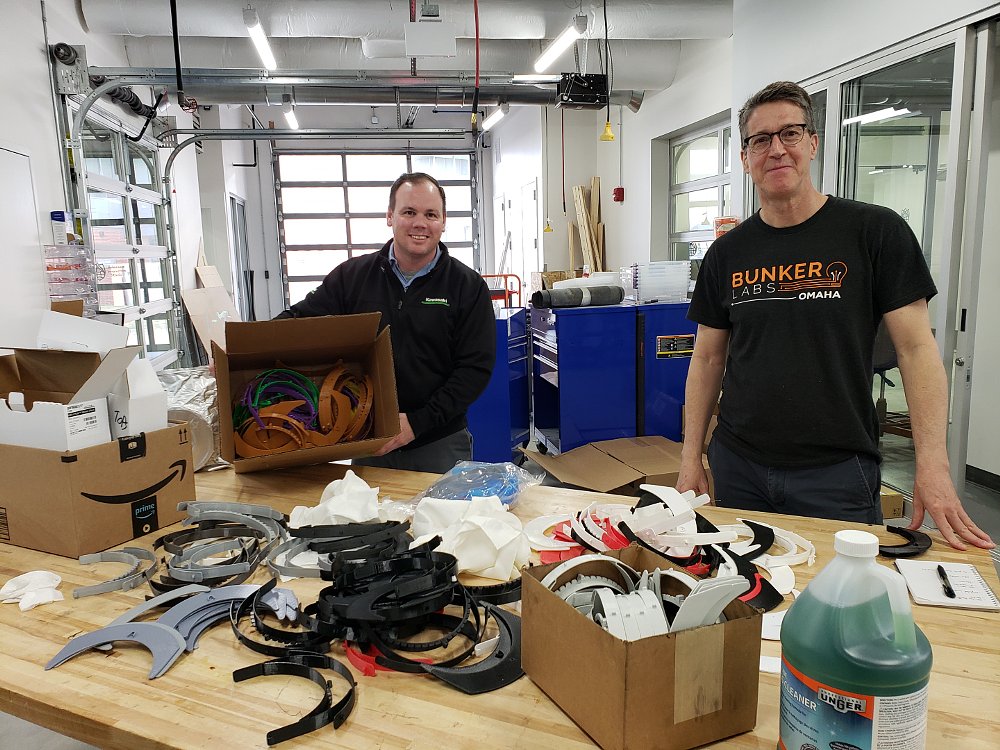
Meanwhile, Nebraska State Patrol officers realized that they had plenty of masks but nowhere near enough replaceable filters, as well as hundreds of new, old-stock filters for a previous generation of masks they’d long since thrown out. Kawasaki’s R&D staff MacGyvered up a way of fitting the old filters to the new masks, by adapting a rubber gasket normally used in the manufacture of Jet Skis! Kawasaki is also 3D-printing face shields.
Across India
India waited a long time to act, then the government of Prime Minister Narendra Modi suddenly placed the entire country on a strict lockdown. The decree gave 1.4 billion Indians only a couple of days to prepare and threw the country into chaos.
Indian motorcycle companies were having a crap year even before the pandemic, but despite that most are softening the blow for customers by extending warranties that expire during the lockdown period.
Sunny Soral, a leading writer about the automotive and motorcycle industry in India, told me of several examples of the industry helping the relief effort.
Bajaj Group, an enormous diversified conglomerate that owns the Bajaj Auto, one of the world’s largest motorcycle manufacturers, has pledged a billion rupees in support of COVID-19 programs. That works out to about $13 million. Bajaj donations are to be focused on upgrading hospitals in the Pune district.
Rajiv Bajaj, managing director and chief executive officer of Bajaj Auto has said, “I will cut my salary to zero before a single employee is laid off.”
Eicher Motors, the parent company of Royal Enfield, has already pledged the equivalent of about $6.5 million. Some of that money will be spent on food and sanitation supplies, as well as setting up sanitation facilities in underprivileged communities across the country. Eicher will also purchase and distribute personal protective equipment to hospitals in Chennai (Royal Enfield’s home town) and fund dedicated COVID-19 specialty wards with isolation areas and ventilators.
TVS, another huge Indian motorcycle and scooter maker, has donated millions of dollars to the Prime Minister’s National Relief Fund and has also donated money that will be spent in the company’s home region of Tamil Nadu. TVS operates its own charitable organization, the Srinavasan Services Trust. Through that group, TVS has made and distributed over 750,000 face shields for health care workers and helped out in small farming communities by deploying disinfectant teams and distributing meals (prepared in idle factories) for health care personnel and other essential workers.
Hero has pledged over $12 million. Half of that sum will go to the Prime Minister’s Relief Fund, while half will be spent on medical equipment, food, and other essentials distributed under the direction of Hero Group companies.
Honda Motorcycle & Scooter India has its own charity, Honda India Foundation, which has pledged over $1 million. Honda has also supplied 2,000 backpack sprayers to various government agencies for use in disinfection. Honda’s factories have their own private ambulances, which are being made available during the crisis.
Suzuki Motorcycle India, and Maruti Suzuki (autos) have promised up to $100 million — no that’s not a typo — in support of their dealers across India. Suzuki has a motorcycle factory in the state of Harayana, which is now preparing and distributing meals in that area. Maruti Suzuki is partnering with AgVa Healthcare to quickly scale up production of 10,000 ventilators a month.
Mahindra is another diversified conglomerate with a large motorcycle business. The company has already submitted a ventilator design for approval, and has plans to develop temporary healthcare facilities that can be deployed by the Indian army. The group owns resorts and hotels, which it has also offered as temporary care facilities.
Next up: Various locations in Africa
As bad as it’s been in northern Italy or New York City, epidemiologists have nightmares about the pandemic’s spread across Africa, where public health infrastructure’s severely challenged already. Even in good times, it’s hard for community health workers to reach many rural villages. We’ve heard over and over that testing is the key to identifying and isolating COVID-19 cases. That’s especially difficult in a place where getting samples back to a lab can take days. Luckily in several countries there’s already a small army of motorcyclists trained and equipped by Riders for Health.
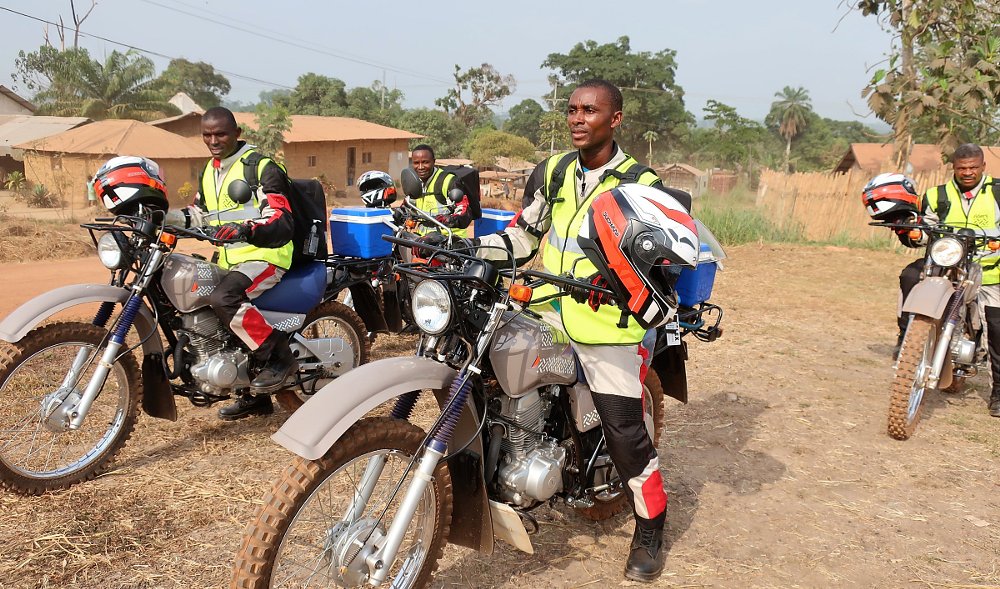
Riders for Health got its start in 1986 when 500 Grand Prix star Randy Mamola realized that many African health initiatives failed when community health workers or vaccines simply couldn’t cover the last few miles to remote villages. As a motorcyclist, Randy knew that a small trail bike was a great solution to this problem. Working with his friends Barry and Andrea Coleman, they created an organization to deliver trail bikes to African health care workers and, just as important, train them to ride and maintain the bikes.
The 2014-16 Ebola outbreak in Liberia once again proved that Riders for Health could play a vital role in disease surveillance. A team of more than 300 riders transported up to 5,000 samples a month. As of last May, the Riders Liberia team had transported 56,000 lab samples a total of 2.5 million miles.
If Africa is to have a chance against COVID-19, Riders for Health will again help to identify outbreaks, get health workers to remote villages, and transport samples back for diagnostic testing.
Are you helping?
If you're doing something yourself or know of other efforts to fight the pandemic, tell us in the comments below.




